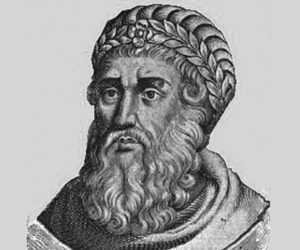The Magi’s Provocation of King Herod
Magi had been traveling on a month’s long quest to find the newborn King of the Jews, according to Matthew.[1] Believing their search was to be somewhere in Judea, it made perfect sense to start in Jerusalem with the King of Judea – Herod.

Promptly gaining direct access to the King, their reputation as Magi probably made that possible. First words spoken by the Magi to Herod sets the stage in the palace:
MT 2:2 “Where is He who has been born King of the Jews? For we have seen His star in the East and have come to worship him.”(NASB, NKJV)
For any king, especially with the personality profile of Herod, it was an embarrassment and no king should ever be embarrassed. As the story unfolds, the King came to quickly view this child’s birth as a real threat that must be dealt with such as Herod had done many times before using whatever means necessary.[2]
All of Jerusalem was “troubled” by the news, too. Translated from Matthew’s Greek text, the word tarasso means “to stir or agitate (roil water).”[3]
Servants came from among the general population, not to mention that throughout history, palaces of kings and queens notoriously have been unable to hold their secrets. Herod’s family was no exception, his family was scandalously known for their loose lips.
News from the Magi certainly shook things up undoubtedly getting the attention of everyone. Stirring the pot tends to cause people to act in peculiar ways.
Word about a new king undoubtedly raised hopes, yet at the same time, it was just as troubling. A newborn king of the Jews – who was his father if it wasn’t Herod?
Would the new king be worse than Herod or hopefully a good king? Regardless, it would still be years before this new king would begin his reign.
A child worthy of worship by the reputed king-makers? Could the babe even be the promised Messiah?
Processing in his mind the Magi’s alarming news, after the Magi left the palace, the King immediately assembled “all the chief priests and scribes of the people.” Making it clear he believed the Magi’s proclamation, he asked the Jewish religion experts to determine “where the Christ was to be born.”[4]
Herod used the Greek word, Christos, translated as “Christ” or “Anointed” and asked where he was to be born? Jewish religion experts understood the King’s question and responded, “In Bethlehem of Judea” citing the prophecy of Micah.[5]
Upon hearing Micah’s prophecy, the King’s focus changed. No star was mentioned in Micah’s prophecy nor recorded by Matthew in the response from the chief priests and scribes.
Matthew does not say Herod was unaware of the star event – it can only be said that he did not know when it had occurred. Events in the sky would likely have been a relatively petty matter to the King prior the Magi’s visit, especially considering his bigger political problems in the kingdom, with Rome, and scheming family affairs.
As religion experts, they were likely fully aware of Balaam’s prophecy of a star coming forth from Jacob signifying a ruler of Israel.[6] Maybe they mentioned this to Herod, maybe not, regardless the King believed the Magi.
Up to this point, the actual appearance of the star witnessed by the Magi astronomers had been only incidental information. Had the star been the most attention-getting news from the Magi, a cynical Herod would have been expected to question it, even scoff at it – he didn’t.
One thing is for certain, Herod had a new fixation: when did this star appear? It was a detail that did not pass his attention and was now important – the information would establish a timeline.
Summoning the Magi back to the palace, Herod wanted this second meeting to be in secret. Since word was all over Jerusalem about the Magi’s initial visit to the palace, the secrecy of the second meeting strongly suggests the King had something to hide.
Herod now possessed two details of interest to the Magi – Micah’s prophecy corroborating the birth of a Jewish ruler and the general location of Bethlehem where he could be found. He could use this information as leverage to learn when the star had appeared. During this second meeting, Herod answered the question of the Magi.
Wanted by Herod was one other thing … the Magi were asked to report back to him with the exact location of the child. Of course, he said, it was under the pretense that he, too, could worship the new king.
In Bethlehem, the Magi found Jesus and worshiped him offering expensive gifts of gold, frankincense and myrrh. The Magi may have intended to inform Herod of the child’s whereabouts until they were warned in a dream not to go back to Herod.
Returning home by another route the Magi avoided Jerusalem. Herod soon realized he had been duped and became enraged, then ordered all the children 2 years and younger to be killed in the district of Bethlehem based on the timing of the star’s first appearance ascertained from the Magi.
King Herod was more than capable of such cruelty. Among many murders, he had killed a chief priest, his second wife, her grandfather, her two sons and would soon execute his firstborn son by his first wife.[7]
His cruelty extended even to his death bed. The King summoned all the principal men of Judea to Jericho, locked them in the hippodrome, and gave orders to have them killed just to deny them the opportunity to gloat over his death.[8]
Does Herod’s reactions ring true to the Magi’s declaration that the Messiah, King of the Jews, had been born in Bethlehem?
Updated November 27, 2024.
This work is licensed under a Creative Commons Attribution-NonCommercial-NoDerivatives 4.0 International License.
REFERENCES:
[1] 1, 3, 6, 7; Book XVI, Ch.VII, VIII, X; Book XVII, Ch. IV “Trade between the Romans and the Empires of Asia.” 2000. Heilbrunn Timeline of Art History. <http://www.metmuseum.org/toah/hd/silk/hd_silk.htm> “Trade Routes.” Smithsonian|The National Museum of American History. n.d. <http://web.archive.org /web/20160618154742/http://americanhistory.si.edu/numismatics/parthia/frames/pamaec.htm> “46178 -wisemen-magi-jesusbirth.” KFAX AM 1100. photo. n.d. <https://media.swncdn.com/cms/CW/46178-wisemen-magi-jesusbirth.1200w.tn.jpg> Flavius. Antiquities of the Jews. Book XV, Ch.VII-VIII; Book XVI, Ch. VIII, XI, IX, XIII, XVI. Book XVII, Ch. I, V. Josephus. Wars. Book I, Ch. XVIII, XXII, XXIV, XXXI, XXXIII. The Complete Works of Josephus. 1850. <http://books.google.com/books?id=e0dAAAAAMAAJ&printsec=frontcover&source=gbs_ge_summary_r&cad=0#v=onepage&q&f=false> Strabo. Geography. Chapters II-III. n.d. <http://www.perseus.tufts.edu/hopper/text?doc=Perseus:text:1999.01.0239:book=1:chapter=2&highlight=magi> <http://www.perseus.tufts.edu/hopper/text?doc=Perseus:text:1999.01.0239:book=15:chapter=3&highlight=magi> Diogenes Laertius. Lives of Eminent Philosophers. n.d. <http://www.perseus.tufts.edu/hopper/text?doc=Perseus:text:1999.01.0258:book=1:chapter=prologue&highlight=magi> Stillwell, Richard et. al. “Gaza Israel.” The Princeton Encyclopedia of Classical Sites. n.d. <http://www.perseus.tufts.edu/hopper/text?doc=Perseus:text:1999.04.0006:entry=gaza&highlight=caravan>
[2] Josephus. Antiquities. Book V, Ch. 1; Book XV, Ch., VI. Josephus. Wars. Book I, Ch. XXVI, XXII, XXIV, XXVI, XXX, XXXI. “Herod the Great.” 2017. Livius.org. <http://www.livius.org/articles/person/herod-the-great
[3] Net.bible.org. Matthew 2:2 Greek text. <http://classic.net.bible.org/verse.php?book=Mat&chapter=2&verse=2> Strong, James, LL.D., S.T.D. The New Strong’s Exhaustive Concordance of the Bible. “tarasso <5015>” Thomas Nelson, Inc. 1990.
[4] NET, NIV, NASB, NRSV, NKJV.
[5] Matthew 2:5. NET, NIV, NASB, NRSV, NKJV. Matthew 2:4. NetBible.org. Greek text. “5547.” n.d. <https://classic.net.bible.org/verse.php?book=Mat&chapter=2&verse=4> “G5547.” LexiConcordance..com. n.d. <http://lexiconcordance.com/greek/5547.html>
[6] Maimonides, Moses. Mishneh Torah. “The Law Concerning Moshiach.” Kesser.org. n.d. <http://www.kesser.org/moshiach/rambam.html#SIE> Rich, Tracey R. “Mashiach: The Messiah.” Judaism101. 2011. <http://www.jewfaq.org/mashiach.htm
[7] Josephus. Antiquities. Book XV, Ch. III-VII, IX, XIII, XVI; Book XVI, Ch. XI; Book XVII, Ch. IX.
Josephus. Wars. Book I, Chapter XXII, XXVII, XXXIII.
[8] Josephus. Antiquities. Book XVII, Ch. VI. Josephus. Wars. Book I, Ch. XXXIII.

